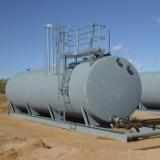Diesel Changes: More Fuel Contamination
It's not just ethanol in gas that's been changing the fuel landscape and causing unexpected problems. Now that ultra-low sulfur diesel fuel has been...

Jim Fitzpatrick, Vehicle Parts Manager at the City of Orlando, was kind enough to talk with us about his experience with fuel, fuel storage issues, and potential solutions for those problems.
Below are our questions and his answers.
 You just can’t put fuel in a storage tank and expect it to be good for years anymore.
You just can’t put fuel in a storage tank and expect it to be good for years anymore.
With the lower sulfur content in diesel fuel to comply with emissions regulations, the fuel doesn’t have that natural biocide in it any longer. The result is growth of bacteria that, in our experience, leads to a series of problems. We’ve seen clogged filters that can get so bad that they can stop engines. We have fuel storage tanks at our fire stations and fleet garages, and we buy from fuel distributors, so this issue affects all parts of our fuel supply chain.
We also need generators for waste water treatment for the city. These are back-up generators that only run for a few minutes per month. This short time of operation does not use much fuel so it does not get re-cycled. Water can get in the fuel storage tanks through condensation, rain and run off from fill neck or ports on the tanks. It is difficult to keep water out of storage tanks, especially here in Florida where we get a lot of rain and humidity along with high temperatures.
In our experience, the water that builds up in stored diesel fuel causes damage to the storage tanks. The inside of the tanks can become corroded and the resulting particulates end up in the fuel and that plugs up our diesel engines.
Along with corrosion in the tanks, we also see it in diesel fuel pumps. They are made of aluminum and are vulnerable to corrosion. Water and acidic content can ruin a pump.
We have an as-needed program and we use Bell Performance fuel additive products for that program.
We test our tanks, engines, and generators on a regular basis and apply additives or fuel polishing as needed. The Bell DFS Plus product helps us eliminate water in the stored fuel. If the water and bacteria levels are too high, we then go to fuel polishing and use Bell Performance's Bellicide as a biocide to kill the microbes.
Bell Performance helped us understand the issues of stored fuel and the issues that come up over time. They’re local, so they have been here on a regular basis and have helped educate us on our challenges and the best possible solutions.
Yes, as an example, one of our underground storage tanks at a police station had an issue with a lot of water in the tank. The water emulsified in the fuel and significantly reduced the quality of the fuel. At the time, we had no method or time to clean it, and police stations need to have fuel available so we did not have a lot of time to fix this issue.
We ended up losing 1,400 gallons of fuel.
Recently we had a similar issue at a fire station and Bell Performance brought out their fuel polishing system. The technician was able to pull out the emulsified fuel, filter it, and return the good fuel to the storage tank. We saved over 1,000 gallons and thousands of dollars in potentially lost fuel.
Bell Performance is always accessible and always helping us. They are developing new solutions to the issues we have and provide lots of educational info like webinars. Their goal is educate me from my perspective on the things that we need to pay attention to since fuels are changing. Fuel is a big part of our budget, so we need to know what to do to make the most of it, and Bell Performance definitely helps us do that.
It's not just ethanol in gas that's been changing the fuel landscape and causing unexpected problems. Now that ultra-low sulfur diesel fuel has been...

Danny O'Flaherty, the City Fleet Manager for the City of Holly Hill, FL, had a problem. He was tired of the sales people from fuel additive companies...

For generators and diesel storage tanks fungus, mold, and bacteria pose a serious threat because they can clog fuel filters and decrease efficiency. ...